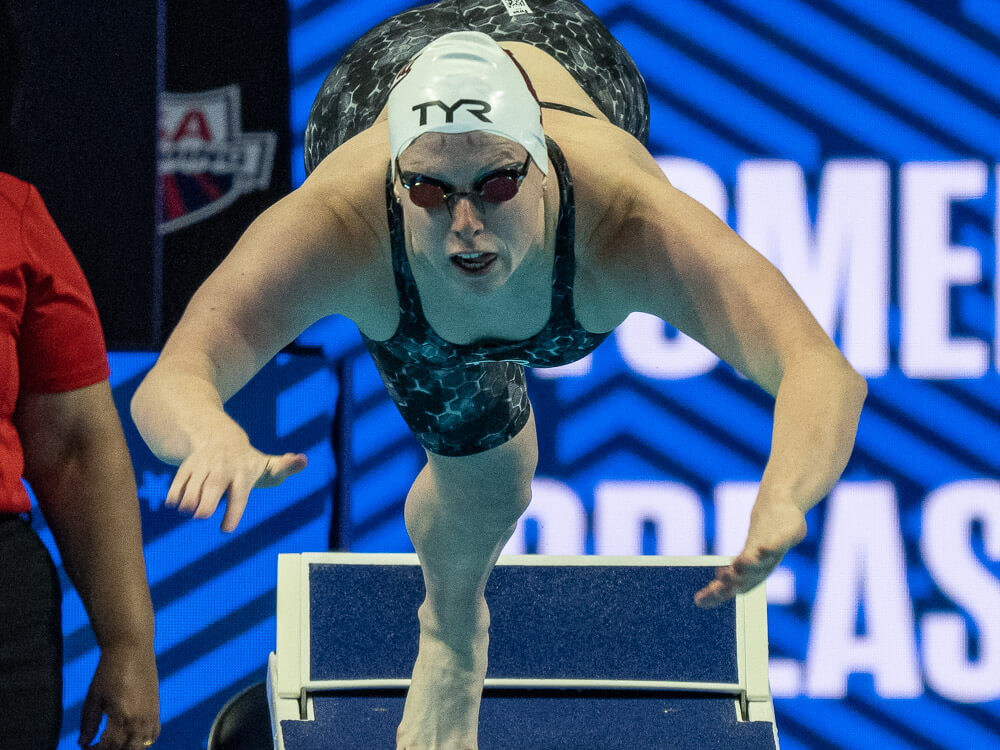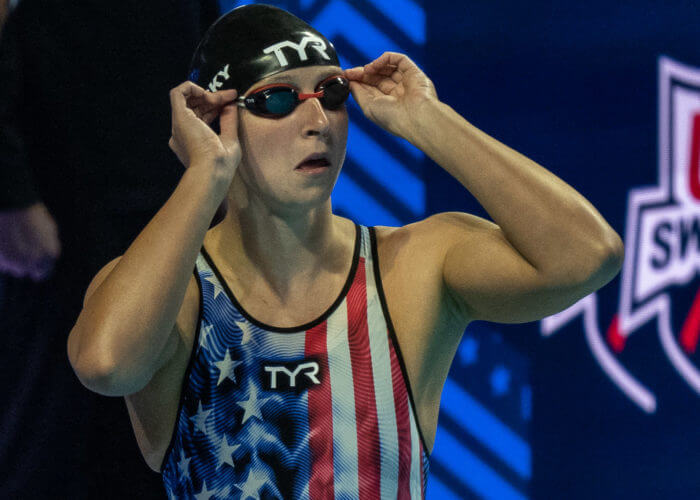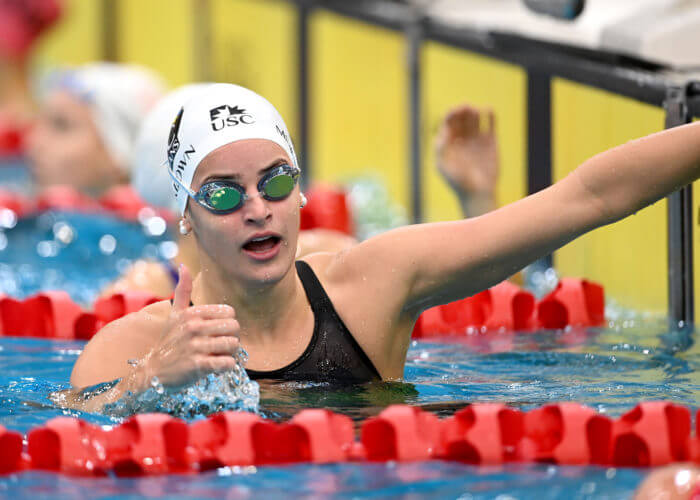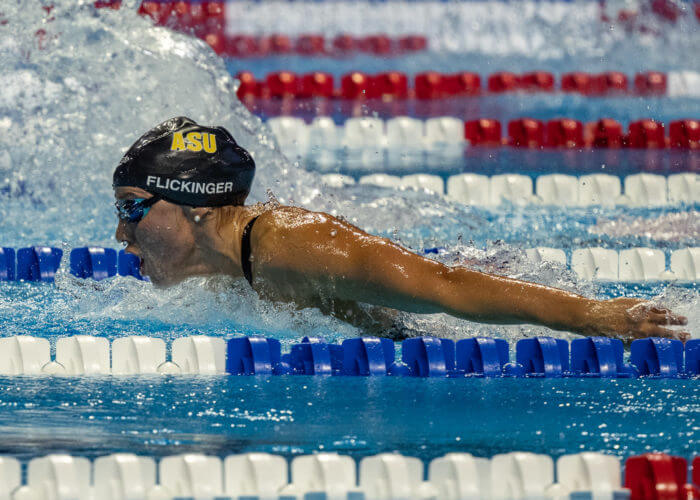Breaking Down the Favorite Status for Each Women’s Event at the Tokyo Olympics

Breaking Down the Favorite Status for Each Women’s Event at the Tokyo Olympics
Looking ahead to the Tokyo Olympics, it’s clear who will take home the gold medal in plenty of events. All the times and recent history (and perhaps even not-so-recent history) all point in one direction, a solid favorite at the top of her game. In other events, maybe two or three or four swimmers all figure to be in the mix for gold and the event could come down to the wire. In yet other events, we have no idea beyond educated guesses who will come out on top because the field is so tight and no swimmer has distinguished herself.
So with a week to go, let’s break down the individual swimming events for the Tokyo Games, beginning with the 14 women’s races in the pool. Events will be divided into four categories: Heavy Favorites; Slight Favorites; Multiple Contenders; and Wide Open.
Heavy Favorites
100 Breaststroke: Lilly King is the defending Olympic gold medalist, two-time world champion and world-record holder. She has not lost the 100 breast since 2015, and her 1:04.72 at Olympic Trials was faster than any swimmer has gone since 2017 and almost a second faster than any of her Tokyo competition in this event besides fellow American Lydia Jacoby. King’s longtime rival, Russia’s Yuliya Efimova, has not been at her best this year, and her season best of 1:06.22 ranks 13th in the world. Yes, this is a lock.
200 Freestyle: This was a tough call to put into the “heavy favorites” category, but Ariarne Titmus swam a 1:53.09 in the 200 free last month. That’s a tenth off the world record, and no one else has touched 1:53 since 2016. Katie Ledecky, Yang Junxuan and Siobhan Haughey have all swum 1:54s this year, and maybe world champion and world-record holder Federica Pellegrini can muster one last surprise, but it’s really tough to see anyone getting close to the time Titmus swam in June. If she can repeat 1:53-low, she will be the Olympic champion.

Photo Courtesy: Peter H. Bick
1500 Freestyle: The 1500 will be Ledecky’s second final of the day, after the 200 free, but she’s virtually untouchable in this one. Her season-best time of 15:40.16 is six seconds faster than anyone else in the world—while still a whopping 20 seconds off her world record. Ledecky owns the 10-fastest times in history in this event, along with 13 of the top 15 and 16 of the top 20. She won three straight world titles prior to missing the race at the 2019 Worlds while ill, and she is heavily favored to win the inaugural Olympic gold as well.
200 Backstroke: Kaylee McKeown has burst onto the scene in the last year as a legitimate gold medal favorite. She ranks third all-time in the 200 back at 2:04.28, and after world record-holder Regan Smith did not qualify to swim the event for the U.S. at the Tokyo Olympics, it’s tough to see anyone touching McKeown here. No one else has been under 2:05 this year, and only two swimmers have swum in the 2:05 range, Italy’s Margherita Panziera and the USA’s Rhyan White.
800 Freestyle: Again, it’s Ledecky, the owner of the 23-fastest performances in history, including the 8:13.64 from earlier this year (ranked 22nd). While Ledecky’s 8:14.62 from U.S. Olympic Trials is less than a second ahead of Titmus’ 8:15.57 from Australia’s Trials, Ledecky should have enough in the tank to open up this margin significantly at the Tokyo Olympics, although probably not the 11-second margin of victory from the 2016 Games. A gold medal here would make Ledecky just the third woman to win three straight Olympic golds in one event, joining Australia’s Dawn Fraser (100 freestyle in 1956, 1960 and 1964) and Hungary’s Krisztina Egerszegi (200 backstroke in 1988, 1992 and 1996).
Slight Favorites
400 Individual Medley: Katinka Hosszu is probably the favorite here because even if she is not at her best, it should not take anything close to her world record of 4:26.36 from the Rio Games to win gold . Hosszu ranks fifth in the world at 4:34.76 (swum on her way to gold at the European championships last month), but the four swimmers ahead of her are all Americans. Neither of the two that qualified for the Tokyo Olympics (Emma Weyant and Hali Flickinger) have ever competed in the 400 IM at a major international meet. Japan’s Yui Ohashi will also be close in this one, but despite her iffy results this season, the weakness of the field allows Hosszu to remain a favorite.
400 Freestyle: Ariarne Titmus has swum really, really fast this year, with her 3:56.90 from Australia’s Trials coming up less than a half-second short of Katie Ledecky’s world record. Ledecky’s season-best time, meanwhile, is more than two seconds behind at 3:59.25. Still, we’re going to give Ledecky the benefit of the doubt and say she will push Titmus. Titmus is probably the favorite, but Ledecky has such an impressive track record in the event and she will be going for revenge after Titmus beat her out for gold at the 2019 World Championships.

Photo Courtesy:
100 Backstroke: Kaylee McKeown was nipping at the world record in the 100 back all year, and she finally took it down at Australia’s Olympic Trials, recording a 57.45 to clip Regan Smith’s previous record of 57.57. But two-time defending world champion Kylie Masse of Canada has been as quick as 57.70 this year, and Smith swam a 57.92 at U.S. Olympic Trials. Great Britain’s Kathleen Dawson is close to breaking 58 herself after recording a 58.08 at the European Championships to take down a 12-year-old national record. McKeown is the favorite right now, but these other three certainly have a shot.
200 Individual Medley: McKeown is also the gold-medal favorite in the 200 IM after recording the top time in the world this year at 2:08.19, but several others are right in the mix. American Alex Walsh has swum a 2:08.87. Abbie Wood, Sydney Pickrem and Kate Douglass are all sitting in the 2:09-low range. Japan’s Ohashi is an experienced veteran with World Championships medals to her name. And what should we make of defending Olympic champion and four-time world champion Hosszu? She hasn’t swum well in 2021—her season-best time is 2:10.12, and she fell to bronze at the European Championships. An on-form Hosszu is the favorite here, but given her struggles, we’ll consider her one of several favorites.
Multiple Contenders
100 Butterfly: World-record holder Sarah Sjostrom may not even swim the 100 fly at the Tokyo Olympics after fracturing her elbow earlier this year, but this race would set up as a compelling battle for gold even with Sjostrom at her best. Three women have broken 56 this year, the USA’s Torri Huske (55.66), China’s Zhang Yufei (55.73) and Australia’s Emma McKeon (55.93), while Canada’s Maggie MacNeil has been 56.19 after upsetting Sjostrom to win the 2019 world title in 55.83. Any of this group could end up winning gold in Tokyo.
100 Freestyle: Sjostrom is also the world record-holder here, and her recent 53.47 in the event suggests she could be a factor. But the favorites are likely Australians Emma McKeon and Cate Campbell, who have swum respective times of 52.19 and 52.59 this year. Canada’s Penny Oleksiak and China’s Zhang Yufei both have sub-53 swims to their credit this year, while the absence of world and Olympic champion Simone Manuel opens the field up a little more.
Wide Open

Photo Courtesy: Peter H. Bick
200 Butterfly: This race has become incredibly tough to predict since Mireia Belmonte stormed to Olympic gold in 2016 and the world title a year later. Belmonte is still competing, but she has not registered a 200 fly ranked in the top 100 in the world this year. And in 2019, only two swimmers broke 2:07 as distance-swimmer-turned-butterflyer Boglarka Kapas edged out American Hali Flickinger in a tight finish at Worlds. This year, China’s Zhang Yufei and Flickinger are the only swimmers under 2:06, and only Kapas and the USA’s Regan Smith have been 2:06s. The event does not look to be incredibly fast, so there is plenty of room for another swimmer—maybe Japan’s Suzuka Hasegawa or China’s Yu Liyan or Australia’s Brianna Throssell—to move into the medal mix or even challenge for gold.
200 Breaststroke: No one has touched a 2:19 200 breast since Rikke Møller Pedersen set the world record of 2:19.11 in 2013, and there are about six swimmers with legitimate hopes of challenging for a gold medal. South Africa’s Tatjana Schoenmaker has the top time this year and the fastest best time of anyone in the field with her 2:20.12, while Great Britain’s Molly Renshaw has been 2:20.89 this year. The USA’s Annie Lazor is the third-ranked swimmer in the world at 2:21.07 (having swum a 2:20 previously in her career), and Russia’s Evgeniia Chikunova, Great Britain’s Abbie Wood and the USA’s Lilly King have all been 2:21s this year. Russia’s Yuliya Efimova, who has dominated this race at the last two World Championships, will not compete in the four-lap breaststroke race in Tokyo.
50 Freestyle: The splash-and-dash is always unpredictable, and the Tokyo Olympics should be the same. So far this year, Australians Emma McKeon and Cate Campbell and the Netherlands’ Ranomi Kromowidjojo (the 2012 Olympic champion) have all swum 23.9s in the 50 free. 2016 gold medalist Pernille Blume of Denmark and Poland’s Kasia Wasick have swum well, while both world-record holder Sarah Sjostrom and defending world champion Simone Manuel have season-best times of 24.2. This one could end up with a lot of different results.



